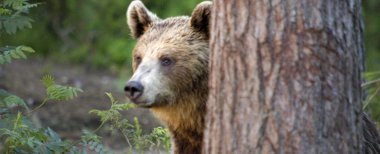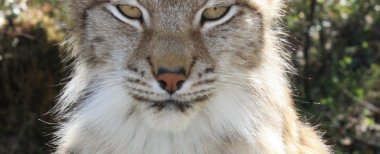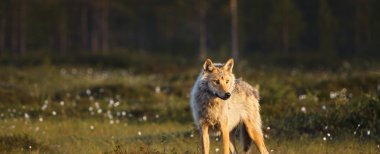latest news
Ministry of Agriculture and Forestry
Jun 28, 2019 14:17New draft Management Plan for the Wolf Population sent for comments
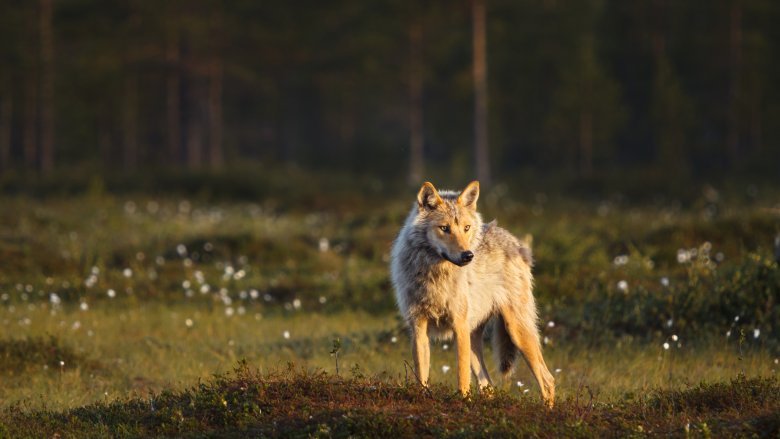
A draft of the updated Management Plan for the Wolf Population has been sent out for comments. The management plan is intended as a tool for managing the Finnish wolf population and wolf-related conflicts and an important means for implementing wolf policy. The plan also fulfils Finland’s international obligations concerning the protection of species. Comments on the draft will be accepted until 30 August 2019.
The short-term goal of the management plan is for the wolf population to reach the minimum size needed for a vital population, while the long-term goal is a favourable conservation status. These goals are supported by the following factors of change detailed in the plan:
- promoting tolerance of wolves and creating a foundation for the acceptance of wolves,
- preventing wolf-related damage and taking measures to mitigate risks and damage,
- deepening and broadening knowledge about the wolf population,
- advancing dialogue between administrative authorities, research bodies and interest groups,
- strengthening cross-border cooperation, and
- implementing a variety of population management measures.
To improve the sense of safety among people living in wolf territories, the practices for how to proceed in the event of a wolf sighting in yard areas or nearby have been described in further detail. The management plan now also includes the definitions of a wolf posing concern, risk or danger, along with a clearer description of the roles of the Finnish Wildlife Agency and the police in wolf-related matters. An important measure for improving people’s sense of safety and tolerance of wolves is the prevention of damage to farm animals and dogs. A central tool for the prevention of damage is preventive communication in areas where wolf territories are forming.
The new draft management plan approaches the question of the wolf from the perspective of multispecies population management, which means taking into account the interaction between large carnivores and ungulates. Another important goal of the management plan — as was the case with the previous plan — is to prevent the illegal killing of wolves.
- We wanted to highlight promoting tolerance of wolves as a central goal right at the beginning of the management plan. The other factors of change and measures in the plan support this main goal. The management plan aims to meet the conservation needs of the species and to manage social conflicts related to wolves, says Vesa Ruusila, chair of the working group preparing the management plan and Head of Unit for Game and Fisheries at the Ministry of Agriculture and Forestry.
Dialogue on wolf-related matters of key importance
A central goal of the measures detailed in the management plan is to support local people living in wolf territories. An important element in this work are the wolf territory cooperation groups made up of representatives from different interested parties. According to the new draft of the management plan, the work of these groups should be further developed. Dialogue is also needed at the international level. With this in mind, the draft management plan includes measures for strengthening cooperation with Sweden and Norway, for example.
Jaana Husu-Kallio, Permanent Secretary at the Ministry of Agriculture and Forestry and chair of the steering group in charge of the project to update the management plan, feels the process has been a success and extends her gratitude to all who participated.
- Our cooperation with interest groups in updating the management plan has been very fruitful and successful. I am especially pleased with the good team spirit we had during the preparations, even though the matter itself was quite challenging. We need to keep up this good dialogue moving forward, too. To make sure this happens, we plan to continue engaging in productive dialogue at annual wolf forums, for example. We also plan to organise regular, cross-regional events dealing with wolf-related issues at the local level. In addition, we must focus on strengthening communications, which has been indicated as a measure in the management plan, Husu-Kallio emphasises.
The basis for the updated management plan is the original plan adopted in 2015. The most important changes concern the measures detailed in the plan. The new plan also includes three project plans, which are related to wolf-related communications, creating a game sighting service and planning population management-based hunting.
Population management-based hunting can be added as a project if the judgments of the European Court of Justice and the Supreme Administrative Court allow for this. The targets, method of implementation and conditions of population management-based hunting will be planned in cooperation with the relevant interest groups.
The project on updating the Management Plan for the Wolf Population was launched in September 2018. The project has a preparation group and a steering group, both of which have met several times over the course of the project. The groups also received suggestions on updating the management plan through an electronic survey sent to wolf territory cooperation groups and at events for interested parties organised in spring 2019 in cooperation with the regional wildlife councils.
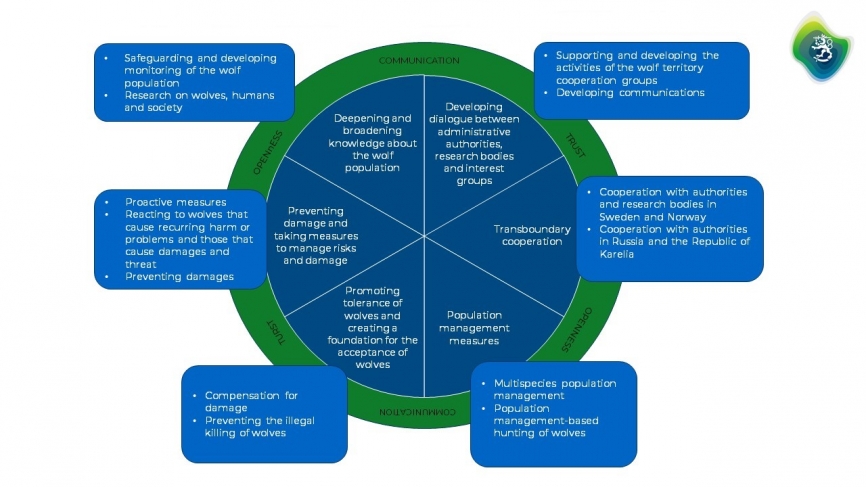
Photo: The main goals and factors of change in the Management Plan for the Wolf Population are presented in this figure in the centre of the circle. The measures related to each goal are shown in the boxes outside the circle.
Request for comments and draft Management Plan for the Wolf Population in Finland (in Finnish)
Inquiries:
Vesa Ruusila, Head of Unit for Game and Fisheries, Natural Resources Department, Ministry of Agriculture and Forestry, tel. +358 295162051, vesa.ruusila@mmm.fi (24 June–7 July and 22 July onwards)
Jussi Laanikari, Senior Specialist, Natural Resources Department, Unit for Game and Fisheries, Ministry of Agriculture and Forestry, tel. +358 40 7336 229, jussi.laanikari@mmm.fi (1–21 July)
Jaana Husu-Kallio, Permanent Secretary, Ministry of Agriculture and Forestry, tel. +358 295162184, jaana.husu-kallio@mmm.fi
News archive
Information on large carnivores in Nordic countries
SKANDULV - wolf research in Scandinavia. SKANDULV is working on issues connected with wolf ecology and administration. The main questions concern wolf populations, movement patterns, genetics, ecosystem effects etc.
